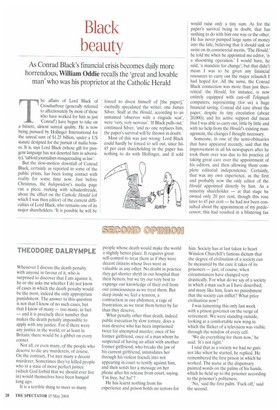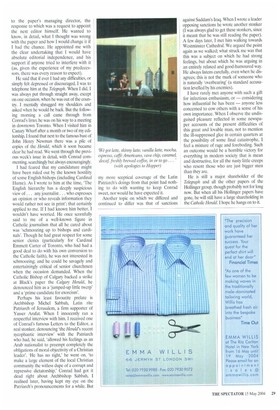Black beauty
As Conrad Black's financial crisis becomes daily more horrendous, William Oddie recalls the 'great and lovable man' who was his proprietor at the Catholic Herald The affairs of Lord Black of Crossharbour (generally referred to affectionately by most of those who have worked for him as just 'Conrad') have begun to take on a bizarre, almost surreal quality. He is now being pursued by Hollinger International for the unreal sum of $1.25 billion, under a US statute designed for the pursuit of mafia bosses. It is, says Lord Black (whose gift for pungent language has not deserted him in adversity), 'tabloid journalism masquerading as law'.
But the slow-motion downfall of Conrad Black, certainly as reported in some of the public prints, has been losing contact with reality for some time now. Just before Christmas, the Independent's media page ran a piece, reeking with schadenfreude, about the effect on the Catholic Herald (of which I was then editor) of the current difficulties of Lord Black, who remains one of its major shareholders. 'It is possible he will be forced to divest himself of [the paper],' excitedly speculated the writer, one James Silver. Staff at the Herald, according to an unnamed 'observer with a ringside seat', were 'very, very nervous'. 'If Black pulls out,' continued Silver, 'and no one replaces him, the paper's survival will be thrown in doubt.'
Most of this was just wrong: Lord Black could hardly be forced to sell out, since his 45 per cent shareholding in the paper has nothing to do with Hollinger, and if sold
would raise only a tiny sum. As for the paper's survival being in doubt, that has nothing to do with him one way or the other. He has never pumped large sums of money into the title, believing that it should sink or swim on its commercial merits. 'The Herald,' he told me when he appointed me editor, 'is a shoestring operation.' I would have, he said, 'a mandate for change': but that didn't mean I was to be given any financial resources to carry out the major relaunch I had hoped for. All the same, the Conrad Black connection was more than just theoretical: the Herald, for instance, is now entirely equipped with cast-off Telegraph computers, representing (for us) a huge financial saving. Conrad did care about the paper, despite its tiny circulation (about 20,000); and his active support did mean that I was able to carry out, little by little and with no help from the Herald's existing management, the changes I thought necessary.
Someone, in one of the semi-obituaries that have appeared recently, said that the improvement in all his newspapers after he took them over was due to his practice of taking great care over the appointment of his editors, and then allowing them complete editorial independence. Certainly, that was my own experience, as the first and probably now the only editor of the Herald appointed directly by him. As a minority shareholder — at that stage he owned only 20 per cent, though this rose later to 45 per cent — he had not been consulted about the appointment of my predecessor; this had resulted in a blistering fax
to the paper's managing director, the response to which was a request to appoint the next editor himself. He wanted to know, in detail, what I thought was wrong with the paper and how I would change it if I had the chance. He appointed me with the clear undertaking that I would have absolute editorial independence, and his support if anyone tried to interfere with it (as, given the experience of my predecessors, there was every reason to expect).
He said that if ever I had any difficulties, or simply felt depressed or discouraged, I was to telephone him at the Telegraph. When I did, I was always put through straight away, except on one occasion, when he was out of the country. I mentally shrugged my shoulders and asked when he would be back_ But the following morning a call came through from Conrad's limo; he was on his way to a meeting in downtown Toronto. When I visited him in Canary Wharf after a month or two of my editorship, I found that next to the famous bust of John Henry Newman there was a pile of copies of the Herald, which it soon became clear he had read. We went through the previous week's issue in detail, with Conrad commenting, searchingly but always encouragingly.
I had feared that my candidature might have been ruled out by the known hostility of some English bishops (including Cardinal Hume). As I wrote to him at the time, 'The English hierarchy has a deeply suspicious view of. . . any journalist. . . who expresses an opinion or who reveals information they would rather not see in print'; that certainly applied to me. If! had known him better, I wouldn't have worried. He once scornfully said to me of a well-known figure in Catholic journalism that all he cared about was Schmoozing up to bishops and cardinals'. Though he had great respect for some senior clerics (particularly for Cardinal Emmett Carter of Toronto, who had had a good deal to do with his own conversion to the Catholic faith), he was not interested in schmoozing; and he could be savagely and entertainingly critical of senior churchmen when the occasion demanded. When the Catholic Bishop of Calgary backed a strike at Black's paper the Calgary Herald, he denounced him as a lumped-up little twerp' and a 'prime candidate for exorcism'.
Perhaps his least favourite prelate is Archbishop Michel Sabbah, Latin rite Patriarch of Jerusalem, a firm supporter of Yasser Arafat. When I innocently ran a respectful interview with him, I received one of Conrad's famous Letters to the Editor, a real stonker, denouncing 'the Herald's recent sycophantic interview' with the Patriarch who had, he said, 'allowed his feelings as an Arab nationalist to preempt completely the obligations of moral objectivity of a Christian leader'. 'He has no right,' he went on, 'to make a large element of the local Christian community the witless dupe of a corrupt and repressive dictatorship.' Conrad had got it dead right about Archbishop Sabbah, I realised later, having kept my eye on the Patriarch's pronouncements for a while. But my more sceptical coverage of the Latin Patriarch's doings from that point had nothing to do with wanting to keep Conrad sweet, nor would he have expected it.
Another topic on which we differed and continued to differ was that of sanctions against Saddam's Iraq. When I wrote a leader opposing sanctions he wrote another stonker (I was always glad to get these stonkers, since it meant that he was still reading the paper). A few days later, I met him walking towards Westminster Cathedral. We argued the point again as we walked; what struck me was that this was a subject on which he had strong feelings, but about which he was arguing in an entirely relaxed and good-humoured way. He always listens carefully, even when he disagrees; this is not the mark of someone who is naturally 'overbearing' (a standard accusadon levelled by his enemies).
I have rarely met anyone with such a gift for infectious enthusiasm, or — considering how influential he has been — anyone less concerned to cow others with a sense of his own importance. When I observe the undisguised pleasure reflected in some newspaper accounts of the present difficulties of this great and lovable man, not to mention the ill-suppressed glee in certain quarters at the possibility of some final catastrophe, I feel a mixture of rage and foreboding. Such an outcome would be a horrible victory for everything in modem society that is mean and destructive, for all the nasty little creeps who resent those who are just bigger men than they are.
He is still a major shareholder of the Telegraph and all the other papers of the Hollinger group, though probably not for long now. But when all his Hollinger papers have gone, he will still have a large shareholding in the Catholic Herald. I hope he hangs on to it.



































































































 Previous page
Previous page